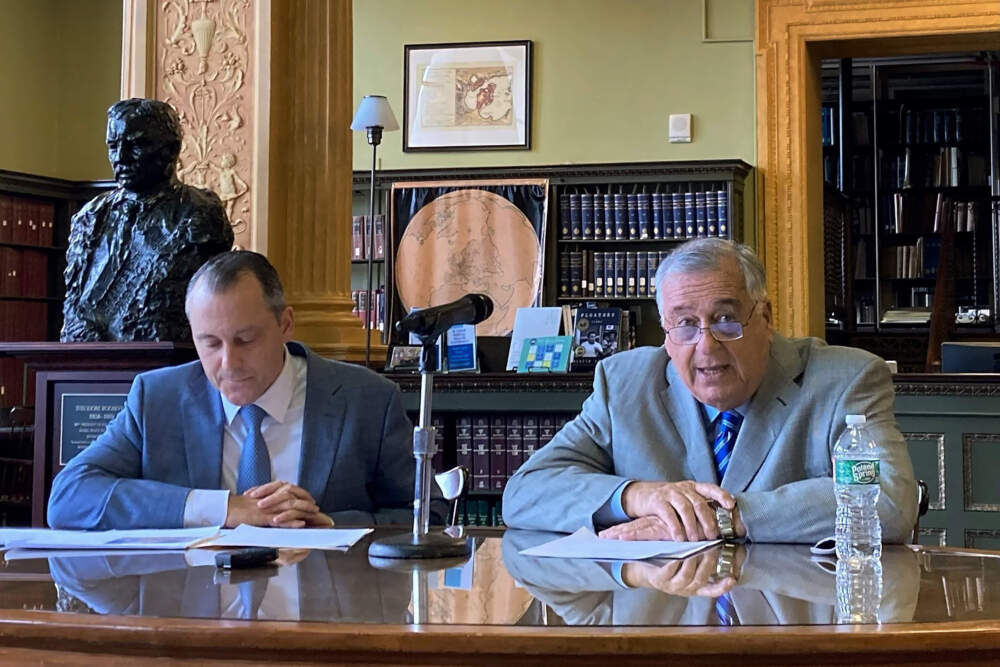Advertisement
Boston's Morning Newsletter
As family shelter system's bills rack up, Mass. House leaders call for changes

Editor's Note: This is an excerpt from WBUR's daily morning newsletter, WBUR Today. If you like what you read and want it in your inbox, sign up here.
Happy leap day! Read more here for a refresher from NPR on the history of Feb. 29, the thorny issues the date can present and one leap day hater’s long-shot proposal for an alternative calendar.
But before you dig in to your copy of La Bougie du Sapeur and free guac from Chipotle, let’s get to the news:
Shelter stress: Democratic leaders in the Massachusetts House say changes to how the state manages its family shelter system are necessary, as increasing demand and declining tax revenue continue to strain the program. “We’re looking at a billion-dollar bill next year in the midst of declining revenues,” House Speaker Ron Mariano said after a Democratic caucus meeting yesterday. “Do you realize what that will do to us? We have to take a look at how we administer this program.”
- What type of changes? The details are still sparse, but Mariano stressed they are not considering repealing the state’s right-to-shelter law. (Any proposed changes would also need buy-in from the state Senate.)
- What is clear: More federal funding — which local elected officials have repeatedly asked for — isn’t coming anytime soon. “We are on our own on this, and we realize that now,” Mariano said.
- What’s next: House Ways and Means Committee Chair Aaron Michlewitz told reporters that the state’s current shelter funding will likely run out in the next few months. He suggested the House will look to pass another supplemental budget bill — separate from the larger annual budget — “at some point by the spring.”
- Go deeper: Gabrielle Emanuel has a closer look here at how shelter spending has exploded over the past two years and why there are two main factors driving those escalating costs.
One of Boston’s busiest corridors is getting a makeover. Mayor Michelle Wu announced a $44 million plan yesterday to redesign three “incredibly chaotic” miles of Blue Hill Avenue, from Mattapan Square to Dorchester’s Grove Hall. WBUR’s Zeninjor Enwemeka has all the details here.
- The biggest feature of the plan is a new dedicated bus lane in the center of Blue Hill Avenue. It would be the city’s second center-running bus lane after opening one on Columbus Avenue in 2021. City officials say the lane will cut down the commute on Blue Hill Avenue for bus riders — including those on the fare-free 28 and 29 bus routes — from up to an hour to just 25 minutes.
- What’s next: The bulk of construction won’t start until 2026. But Wu’s office says they’ll begin work on some smaller improvements this spring, like refreshing crosswalks, fixing potholes and installing new street lights and speed humps on side streets.
Hello, Goodbye: The superintendent of Brockton Public Schools is being put on administrative leave — just days after returning to the job — as the district grapples with a myriad of issues.
- Catch up: Superintendent Mike Thomas went on a sudden, extended medical leave in August, shortly after city officials revealed a $14 million shortfall in the school district’s budget.
- Fast forward: Thomas said this week he was ready to return to work to help tackle ongoing disciplinary issues at Brockton High School. But in what was reportedly a fiery meeting last night, the Brockton School Committee unanimously voted to put Thomas back on leave until the city finishes investigating the deficit.
Cruising to the court: Gabrielle Wolohojian is headed to the Massachusetts Supreme Judicial Court. The appeals court judge — and former domestic partner of Gov. Maura Healey — was confirmed by the state’s Governor’s Council by a 6-1 vote yesterday. Wolohojian will have a seat on the bench until at least Dec. 16, 2030, when she turns 70 (the state’s mandatory retirement age for judges).
- The lone dissenter yesterday was first-term Council member Tara Jacobs, who blasted the “insular” selection process. However, the rest of her colleagues suggested Wolohojian’s “impeccable” qualifications outweighed any concerns.
Cambridge College — which, despite its name, is now based in Boston — is being absorbed by Bay Path University in Western Massachusetts. The move will double Bay Path’s student population to 5,000, as its leaders seek to “expand [its] physical presence into the Boston area.” New England Public Media has more here on what the merger means for students.
P.S.— Did you know there are six communities across the U.S. that were incorporated on leap day? And one of them is in Massachusetts. The South Shore(ish) town of Holbrook is celebrating its 38th leap year birthday this afternoon with a day of community service — a great example for us all on how to make good use of this bonus day.
